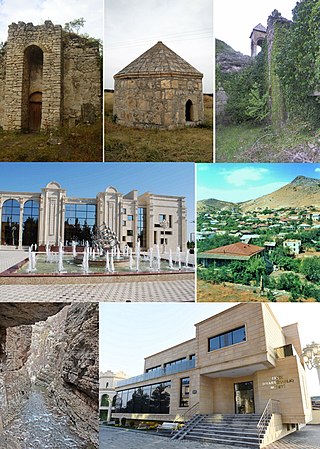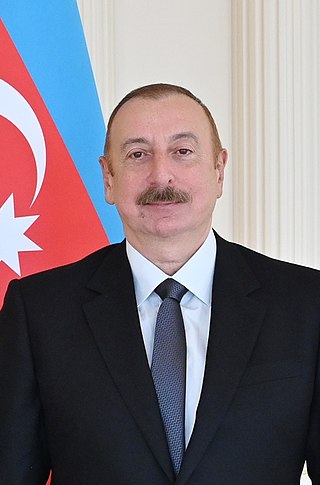
Azerbaijan, officially the Republic of Azerbaijan, is a transcontinental country located at the boundary of Eastern Europe and West Asia. It is a part of the South Caucasus region and is bounded by the Caspian Sea to the east, Russia to the north, Georgia to the northwest, Armenia and Turkey to the west, and Iran to the south. Baku is the capital and largest city.

The Republic of Azerbaijan is a member of the United Nations, the Non-Aligned Movement, the Organization for Security and Cooperation in Europe, NATO's Partnership for Peace, the Euro-Atlantic Partnership Council, the World Health Organization, the European Bank for Reconstruction and Development; the Council of Europe, CFE Treaty, the Community of Democracies; the International Monetary Fund; and the World Bank.

Nagorno-Karabakh is a region located in the South Caucasus, covering the southeastern stretch of the Lesser Caucasus mountain range. Part of the greater region of Karabakh, it spans the area between Lower Karabakh and Syunik. Its terrain mostly consists of mountains and forestland.

Heydar Aliyev International Airport is one of the seven international airports serving Azerbaijan. Formerly, it was called Bina International Airport after a suburb of the Azerbaijan capital Baku. On 10 March 2004, the airport was renamed after the former president of Azerbaijan, Heydar Aliyev. The airport is 20 kilometers northeast of Baku, connected to the city by a highway. It serves as the hub for national carrier Azerbaijan Airlines as well as for Azal Avia Cargo, Buta Airways and Silk Way West Airlines.

Stepanakert or Khankendi is a city in the Nagorno-Karabakh region of Azerbaijan. The city was under the control and the capital city of the breakaway Republic of Artsakh prior to the 2023 Nagorno-Karabakh Azerbaijani offensive. The city is located in a valley on the eastern slopes of the Karabakh mountain range, on the left bank of the Qarqarçay (Karkar) river.

Artsakh, officially the Republic of Artsakh or the Republic of Nagorno-Karabakh, was a de facto breakaway state in the South Caucasus whose territory was internationally recognised as part of Azerbaijan. Between 1991 and 2023, Artsakh controlled parts of the former Nagorno-Karabakh Autonomous Oblast, including its capital Stepanakert. It had been an enclave within Azerbaijan from the 2020 Nagorno-Karabakh war until the 2023 Azerbaijani offensive, when the Azerbaijani military took control over the remaining territory controlled by Artsakh. Its only overland access route to Armenia after the 2020 war was via the 5 km (3.1 mi) wide Lachin corridor, which was placed under the supervision of Russian peacekeeping forces.

Tartar District is one of the 66 districts of Azerbaijan. It is located in the west of the country and belongs to the Karabakh Economic Region. The district borders the districts of Kalbajar, Goranboy, Yevlakh, Barda, and Aghdam. Its capital and largest city is Tartar. As of 2020, the district had a nominal population of 104,700. In March 2023, Azerbaijan began resettling the part of the district that was previously controlled by Armenian forces. Resettlement of the village by Azerbaijan began in March 2023, with 20 families moving back to Talish.

Khojavend District is one of the 66 districts of Azerbaijan. It is located in the west of the country and belongs to the Karabakh Economic Region. The district borders the districts of Lachin, Shusha, Khojaly, Aghdam, Aghjabadi, Fuzuli, Jabrayil, and Qubadli. Its capital and largest city is Khojavend. As of 2020, the district had a nominal population of 44,100.

Islam is the majority religion in Azerbaijan, but the country is considered to be the most secular in the Muslim world. Estimates include 97.3% and 99.2% of the population identifying as Muslim. Of these, a majority belong to the Shia branch (55-65%), while a significant minority (35-45%) are Sunni. Traditionally, the differences between these two branches of Islam have not been sharply defined in Azerbaijan.

The Nagorno-Karabakh conflict is an ethnic and territorial conflict between Armenia and Azerbaijan over the disputed region of Nagorno-Karabakh, inhabited mostly by ethnic Armenians until 2023, and seven surrounding districts, inhabited mostly by Azerbaijanis until their expulsion during the 1990s. The Nagorno-Karabakh region has been entirely claimed by and partially controlled by the breakaway Republic of Artsakh, but is recognized internationally as part of Azerbaijan. Azerbaijan gradually re-established control over Nagorno-Karabakh region and the seven surrounding districts since 2020.

Armenia, officially the Republic of Armenia, is a landlocked country in the Armenian Highlands of West Asia. It is a part of the Caucasus region and is bordered by Turkey to the west, Georgia to the north and Azerbaijan to the east, and Iran and the Azerbaijani exclave of Nakhchivan to the south. Yerevan is the capital, largest city and financial center.
İctimai Television, or İTV, is a public television channel in Azerbaijan. After its legal creation in early 2004, the station began broadcasting on 29 August 2005, making it the first independent public broadcaster in Azerbaijan. The channel is based in Baku.

The Azerbaijani passport is issued by the Ministry of Internal Affairs of Azerbaijan to the citizens of Azerbaijan for international travel. Ordinary passports are valid for 10 years from the date of issue and contain 34 visa pages. Passport content is printed both in Azerbaijani and in English.

Russia and Azerbaijan are de facto and de jure allies in many different aspects, including military. Bilateral relations exist between the Republic of Azerbaijan and the Russian Federation. The Embassy of Azerbaijan is located in Moscow, Russia. The Embassy of Russia is located in Baku, Azerbaijan.

Ilham Heydar oghlu Aliyev is an Azerbaijani politician serving as the fourth president of Azerbaijan since 31 October 2003. He is a former prime minister of Azerbaijan. The son and second child of former Azerbaijani leader Heydar Aliyev, Aliyev became the president of Azerbaijan in 2003 through a presidential election defined by irregularities following his father's death. He was reelected for a second term in 2008 and was allowed to run in elections indefinitely in 2013 and 2018 due to the 2009 constitutional referendum, which removed term limits for presidents. Throughout his electoral campaign, Aliyev served as a member of the ruling New Azerbaijan Party, which he has headed since 2005.

The Organization of Turkic States (OTS), formerly called the Turkic Council or the Cooperation Council of Turkic Speaking States, is an intergovernmental organization comprising prominent independent Turkic countries: Azerbaijan, Kazakhstan, Kyrgyzstan, Turkey and Uzbekistan. It is an intergovernmental organization whose overarching aim is promoting comprehensive cooperation among Turkic-speaking states. First proposed by Kazakh President Nursultan Nazarbayev in 2006, it was founded on 3 October 2009, in Nakhchivan. The General Secretariat is in Istanbul.
Two-thirds of energy in Azerbaijan comes from fossil gas and almost a third from oil. Azerbaijan is a major producer of oil and gas, much of which is exported. Most electricity is generated by gas-fired power plants.
The Azerbaijani diaspora are the communities of Azerbaijanis living outside the places of their ethnic origin: Azerbaijan and the Iranian region of Azerbaijan.

Visitors to Azerbaijan must obtain a visa from one of the Azerbaijani diplomatic missions unless they come from one of the visa-exempt countries, countries eligible for visas on arrival or countries eligible for electronic visas. Visitors must hold passports that are valid for at least 3 months beyond the intended period of stay.

The political status of Nagorno-Karabakh remained unresolved from its declaration of independence from the Soviet Union on 10 December 1991, to its September 2023 collapse. During Soviet times, it had been an ethnic Armenian autonomous oblast of the Azerbaijan Soviet Socialist Republic. Following the dissolution of the Soviet Union, a conflict arose between local Armenians who sought to have Nagorno-Karabakh join Armenia and local Azerbaijanis who opposed this.

















